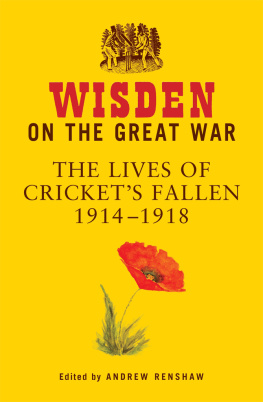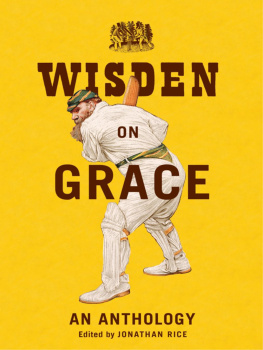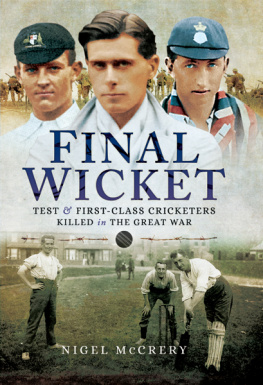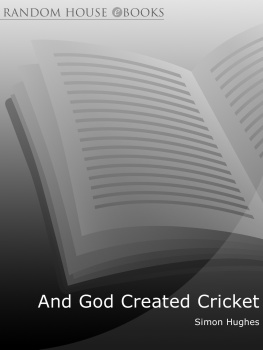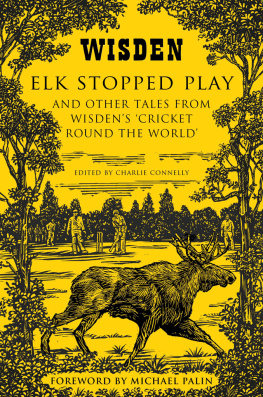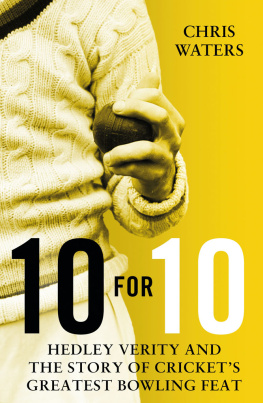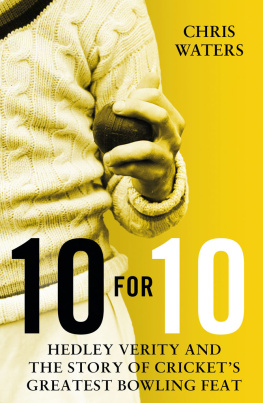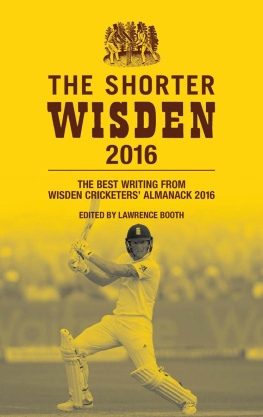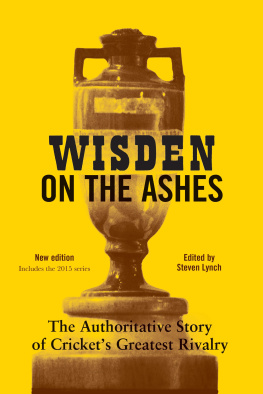
Dedicated to all the cricketers who made the ultimate sacrifice, represented by Wisdens Unknown Soldier, 2nd Lt Niel Fagan (February 26, 1896 July 20, 1916).
Ours to remember, yours to rest
Readers of the 1917 Wisden were warned by editor Sydney Pardon in his Preface: The 54th edition of Wisdens Almanack is of necessity rather a mournful volume. Its chief feature is a record of the cricketers who have fallen in the War the Roll of Honour, so far as the national game is concerned.
The previous year, Pardon continued, the wisdom of publishing Wisden in War time seemed very doubtful, but the experiment was more than justified, a small edition being sold out in a few days.
Sales of that 1916 book were boosted by the tributes it contained to W. G. Grace, in particular, and to Andrew Stoddart and Victor Trumper, but many bereaved families of members of the less well-known cricketing fraternity who had died as comrades in arms also snapped up copies, to keep as cherished memorials to their loved ones.
Ever since, Wisden collectors have been paying the price of the increased demand allied to reduced print runs: original copies covering the years of the Great War attract a substantial premium.
But what resonance do the obituaries have for todays readers, other than to emphasise the indiscriminate carnage of the conflict? A few brighter lights shine out from the gloom, among them the passing reference to the poet Rupert Brooke, who won his place in Wisden because in 1906 he headed the bowling averages for Rugby School; Percy Jeeves, because the cricket-loving P. G. Wodehouse borrowed his name; and in the front rank of the game, Colin Blythe his loss the most serious that cricket has sustained during the war.
The lesser lights have flickered to and fro and dimmed.
However, readers of this book, although they will mourn the loss of the 1,788 men whose obituaries appear in the wartime Wisdens, will discover many good reasons to celebrate their lives, brief and truncated though many of them were. Now those lives are presented in an ordered, accessible and readable way, with much new information and many remarkable stories of courage and coincidence.
For the first time, the obituaries have been arranged by the year of death. Extraneous material mainly relating to schools matches has been deleted in favour of new information. Amid the carnage and confusion, errors inevitably crept into the original lists: details were wrong, there were cases of mistaken identity, and as we will discover, three men in fact survived their Wisden obituary.
There is a complete listing of the 289 men who played first-class cricket and fell in the war. Of these, 89 did not get an obituary in Wisden at the time, but their lives, and deaths, are now recorded here. In addition to the obituaries, there is a list of the 407 men who played first-class cricket and who were decorated for gallantry.
There is also a commentary on how each county was affected by wartime. Although finances were stretched, the county clubs remained in existence thanks both to members who continued to pay subscriptions and, ironically, to the cost savings of not having to stage any cricket.
Ultimately, as Wisden intended at the time, the chief feature is a record of the cricketers who have fallen in the War the Roll of Honour, so far as the national game is concerned. Our aim is to refresh the memory of the cohorts of cricketing soldiers, sailors and airmen who fought and died for their country, and who are commemorated in Wisden.
When Great Britain declared war on Germany on Tuesday, 4 August 1914, a full programme of eight County Championship matches had finished its second day. At The Oval the previous day, a big Bank Holiday crowd of 15,000 had watched Jack Hobbs score 226 in 260 minutes as Surrey strengthened their position at the top of the table by amassing 472 for five against a perspiring Nottinghamshire attack; the day furnished much enjoyment, noted Wisden in its match report, although rain on the third day was to prevent a conclusion.
Wisdens report of Kents game against Sussex began: War being declared on the Tuesday, the Canterbury Week was, of course, shorn of most of its social functions. And the account of the second match, against Northamptonshire, concluded: Owing to the outbreak of the War, the attendance was extremely meagre.
There were immediate changes to the fixture list. The War Office requisitioned The Oval, and Hobbss benefit match against Kent, starting the next Monday, was transferred to Lords where, ending inside two days, it did not yield anything like the sum which could have been confidently expected in normal circumstances.
The response of MCC was this statement issued on August 6: The secretary of the Marylebone Cricket Club feels that no good purpose can be served at the present moment by cancelling matches unless the services of those engaged in cricket who have no military training can in any way be utilised in their countrys service. If it can be shown in what way their services can be used, the MCC would close their ground. Many out-matches have already been abandoned. Cricketers of England would be sure to respond to any definite call.
Northamptonshire made an early decision to abandon their match against Somerset at Taunton on August 10, although Wisden remarked that the countys feelings at the outbreak of War became modified as August advanced. In Kent, the two matches due to be played in the Dover week from August 17 were transferred to Canterbury, where they received little support.
Nonetheless, the first-class cricket season soldiered on. Long Leg in the Sporting Life of August 10 after assuring readers that although there were now horses billeted at The Oval they have not placed a single hoof upon the grass argued: There are no doubt some well-meaning people who regard an indulgence in cricket at the present crisis of our history as a sin that approaches sacrilege. I have already heard murmurs of flannelled fools at the wickets. Yet a little thought must show how wise was the statement made by the secretary of the MCC to the effect that until some means was shown by which untrained men could help their country, cricket should be carried on in the common interest.
Looking back 17 years later in an article in the 1931 Wisden, the MCC secretary, F. E. Lacey (by then Sir Francis), recalled: When the war came in 1914 the committee felt that any tendency towards scare or morbidity should be resisted and an outward show of carrying on was allowed. But the ground and its buildings were, at once, placed at the disposal of the War Office and, the offer having been accepted, were used until the end of the war as accommodation and a training ground for the military.
So, cricket kept calm and carried on for a while at least. Questions were increasingly raised about whether sporting events should continue and other leisure outlets such as theatres should remain open. So far as cricket was concerned, the defining view came from the pen of W. G. Grace, whose letter to the editor of The Sportsman was published on Thursday, August 27. He wrote: There are many cricketers who are already doing their duty, but there are many more who do not seem to realise that in all probability they will have to serve either at home or abroad before the war is brought to a conclusion. The fighting on the Continent is very severe, and will probably be prolonged. I think the time has arrived when the county cricket season should be closed, for it is not fitting at a time like the present that able-bodied men should play day after day and pleasure-seekers look on. There are so many who are young and able, and yet are hanging back. I should like to see all first-class cricketers of suitable age, etc, set a good example, and come to the help of their country without delay in its hour of need.
Next page
